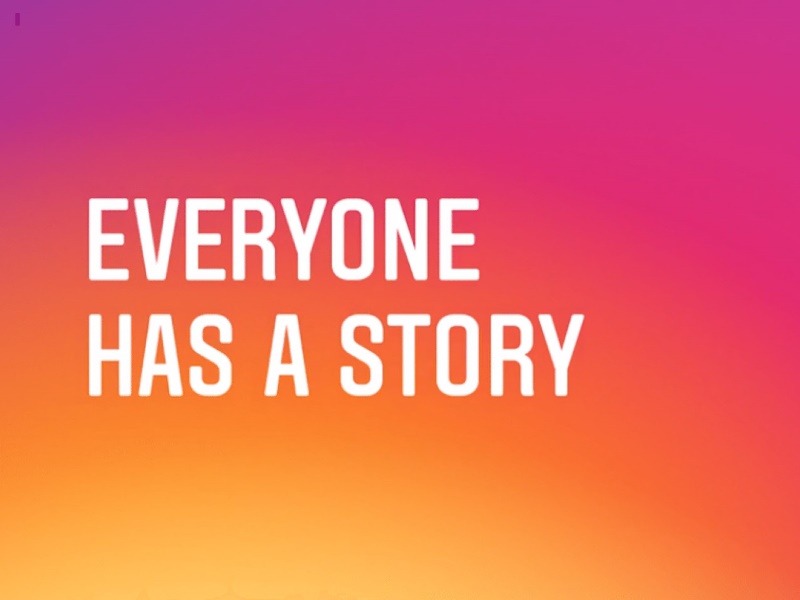- Home
- Social networking
- Social networking Opinion
- What Instagram Stories Says About the State of Social Media
What Instagram Stories Says About the State of Social Media

It's always a bit of a production. You may take a thousands photos of that sunset on the pier, but only "one" lands on the gram. And that "one" took some time. You edited the photo, added a filter. In a world of oversharing, Instagram was for our best selves. High class.
Well, just go ahead and throw that entire first paragraph out the window. With stories, Instagram - which is owned by Facebook - is now encouraging you to share anything and everything to a vertical slide show for friends. Add text, maybe even a doodle, and within 24 hours the story will disappear. If this sounds like Snapchat, you are correct.
This isn't just about Instagram (and, by extension, Facebook) replicating the next fad in social platforming, though that's part of it. This is about how every major platform is looking to jump ship and change course for new audiences.
The giants of social-platforming are all vying for growth. Snapchat and Twitter want to become more accessible. Facebook and Instagram want more original content. Nearly everyone wants live video.
Clearly, none of the major social platforms feel comfortable with their current status - growth is key to survival.
What Instagram/Facebook is doing makes sense. A Bloomberg estimate in June shows Snapchat has more daily active users than Twitter - at 150 million - and some already forecast the app will slow down expected Facebook growth. New trends in the market are forcing long-standing apps to adapt.
Those apps include Snapchat, where snaps now last forever. And Vine, where vines are 140-seconds. Tumblr has live video. You can even add stickers to photos on Twitter. Every platform reinvents what's been done before.
The question is whether, as apps strive to become everything, they risk losing what made them so unique in the first place. That risk is particularly obvious in an app like Instagram, which monopolized the niche for beautiful social photography. Just look at some of the habits Instagrammers have developed: deleting photos that don't compare to their larger collections, limiting themselves to one post per day.
Instagram was for the best of yourself, and Snapchat was for everything else. Now that dividing line seems to have fallen away.
That isn't to say Instagram Stories won't work, of course: This isn't Facebook's first rodeo. Facebook created Slingshot a few years ago to compete directly with Snapchat before taking the app off the market last December. The company also acquired MSQRD (an app with filters and faceswaps, like Snapchat) back in February. On top of that, Instagram has some a robust discover function where you can find your next favorite artist or celebrity with ease, which Snapchat does not. If people start moving toward Instagram in droves, count that as a potential reason.
Still, it's sort of concerning to see these apps drop the features and limitations that once made them unique. Take those away and you're left with little more than a competition for the biggest, best party.
Users now have to now pick between two social networks that never seemed at odds - while losing the distinctions that drew them to Instagram to begin with.
© 2016 The Washington Post
Catch the latest from the Consumer Electronics Show on Gadgets 360, at our CES 2026 hub.
Related Stories
- Samsung Galaxy Unpacked 2025
- ChatGPT
- Redmi Note 14 Pro+
- iPhone 16
- Apple Vision Pro
- Oneplus 12
- OnePlus Nord CE 3 Lite 5G
- iPhone 13
- Xiaomi 14 Pro
- Oppo Find N3
- Tecno Spark Go (2023)
- Realme V30
- Best Phones Under 25000
- Samsung Galaxy S24 Series
- Cryptocurrency
- iQoo 12
- Samsung Galaxy S24 Ultra
- Giottus
- Samsung Galaxy Z Flip 5
- Apple 'Scary Fast'
- Housefull 5
- GoPro Hero 12 Black Review
- Invincible Season 2
- JioGlass
- HD Ready TV
- Laptop Under 50000
- Smartwatch Under 10000
- Latest Mobile Phones
- Compare Phones
- Honor Magic 8 RSR Porsche Design
- Honor Magic 8 Pro Air
- Infinix Note Edge
- Lava Blaze Duo 3
- Tecno Spark Go 3
- iQOO Z11 Turbo
- OPPO A6c
- Samsung Galaxy A07 5G
- Lenovo Yoga Slim 7x (2025)
- Lenovo Yoga Slim 7a
- Lenovo Idea Tab Plus
- Realme Pad 3
- Moto Watch
- Garmin Quatix 8 Pro
- Haier H5E Series
- Acerpure Nitro Z Series 100-inch QLED TV
- Asus ROG Ally
- Nintendo Switch Lite
- Haier 1.6 Ton 5 Star Inverter Split AC (HSU19G-MZAID5BN-INV)
- Haier 1.6 Ton 5 Star Inverter Split AC (HSU19G-MZAIM5BN-INV)







![[Sponsored] Haier C90 OLED TV | Dolby Vision IQ, 144Hz OLED and Google TV in Action](https://www.gadgets360.com/static/mobile/images/spacer.png)









